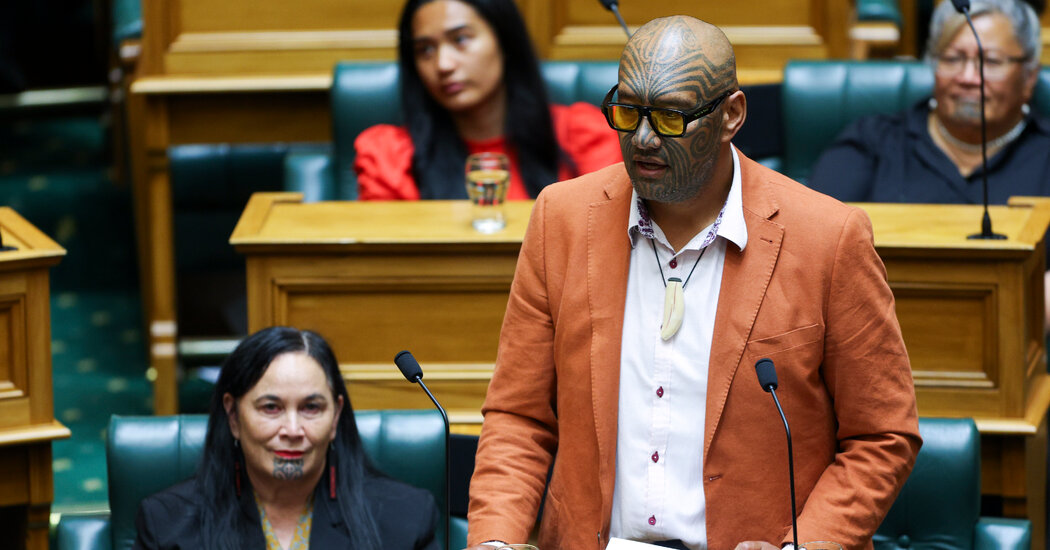New Zealand’s Parliament on Thursday suspended three opposition lawmakers over their performance of the haka, a traditional Māori dance, as a protest while the body was considering a contentious bill last year.
In a party-line vote, lawmakers voted to suspend Rawiri Waititi and Debbie Ngarewa-Packer, the co-leaders of the Te Pāti Māori party, without pay for 21 days. Another member of the party, Hana-Rawhiti Maipi-Clarke, was suspended for seven days.
The penalties were the harshest ever handed down to New Zealand lawmakers and came as the country has been retreating from a decades-long push to support the rights of Māori, its Indigenous people. It has also in recent years been engaging in an increasingly fraught debate about the place of Māori culture in public life.
The bill that drew the lawmakers’ protest was put forward by a member of the governing coalition, the most conservative government in a generation. While it was destined to fail in Parliament, it became symbolic of what opponents characterized as the government’s anti-Māori agenda.
During a reading of the proposed legislation in November, when the speaker asked Ms. Maipi-Clarke how her party would vote on it, she stood up, began to perform the haka and tore up what appeared to be her copy of the bill.
She moved onto the floor of the chamber and continued the performance, joined by Mr. Waititi and Ms. Ngarewa-Packer, as well as Peeni Henare, a Labour Party lawmaker who is Māori. The speaker, Gerry Brownlee, temporarily stopped the session, and Ms. Maipi-Clarke was suspended for a day over the protest, which Mr. Brownlee described as disrespectful.
The bill they were protesting sought to reinterpret the Treaty of Waitangi, which was signed by Māori chiefs and the British Crown in 1840 and is considered New Zealand’s founding document. It forms the basis of the laws and policies aimed at redressing historical wrongs against Māori by colonizers. The bill, Māori activists argued, would wind back many of the gains made in Māori rights over recent decades.
The bill was defeated in April, with 112 of 123 lawmakers — all parties except for the one that proposed it, Act — voting against it.
The four lawmakers were later referred to a committee for potential breaches of Parliament’s rules. The nine-person committee, five of whom belong to the governing coalition, found the three Te Pāti Māori lawmakers had acted in contempt of Parliament and in such a way that “could have the effect of intimidating” other lawmakers. Mr. Henare was not found in contempt.
The punishment was not related to the act of performing the haka, the committee said, but rather, for the Māori lawmakers directing it at members of Act, and Ms. Ngarewa-Packer appearing to simulate firing a gun at another lawmaker. “This was a very serious incident, the likes of which I have never before seen in my 23 years in this debating chamber,” said Judith Collins, the chair of the committee.
The Māori lawmakers rejected the accusations, arguing that the suspensions were disproportionate as past unruly lawmakers had not been subject to such harsh penalties, and reflected a political agenda that demonized Māori culture.
“This was not about disorder, this was just about us standing our truth,” Ms. Ngarewa-Packer said during a three-hour parliamentary debate on Thursday, adding, “We’ve got a government that treats Māori defiance as disorder.”
“Since when did being proud of our culture make you racist?” Ms. Maipi-Clarke said. “Are our voices too loud for this House? Is that the reason why we are being silenced?”
Parliamentarians from the governing conservative coalition voiced support for the suspensions, arguing that the Māori lawmakers had flouted the rules of Parliament and had not sought permission to perform the haka.
“This is not about the haka, it’s about process,” said Nicole McKee, a government minister. “It’s about grandstanding at the expense of this House and how it operates. It’s about just being arrogant and ignorant about how we do laws in New Zealand.”
During the heated debate, acting Prime Minister Winston Peters, who is of Māori heritage, was ordered to apologize to Mr. Waititi for calling his sacred tribal facial tattoo “scribbles on his face.”
The longest prior suspension that a lawmaker had received was for three days, a punishment handed down in 1987 when a former prime minister, Robert Muldoon, had criticized the speaker in a statement, according to local news media.
